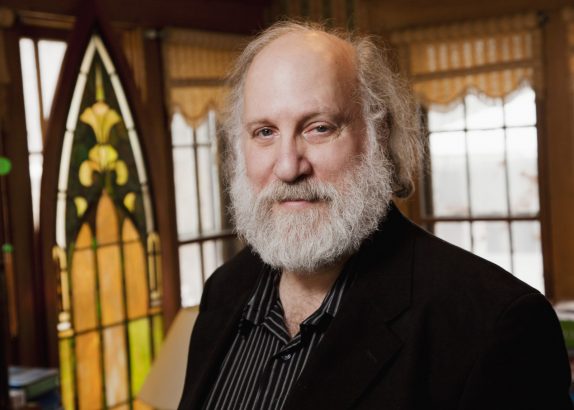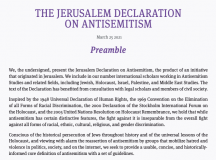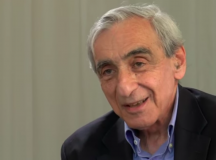Cary Nelson’s responds to replies by Derek Penslar and Michael Walzer to his Fathom article ‘Accommodating the New Antisemitism: A Critique of the Jerusalem Declaration’.
I am very pleased to have a response to my Fathom essay on the IHRA Working Definition on Antisemitism and the Jerusalem Declaration on Antisemitism from Derek Penslar and Michael Walzer, two scholars whom I respect and have talked with in the past. I will address their comments sequentially as their responses are quite different.
I should begin by trying to put to rest an argument that does not originate with Penslar but with Kenneth Stern. Penslar repeats Stern’s claim — that the Working Definition ‘was developed for the purpose of data collection, not policy making.’ I need to be more blunt that I was before. This is a remarkably absurd position. It treats ‘data collection’ in the case of antisemitism as if it were a neutral mathematical calculation, an accumulative list, something an accountant might handle. If it had been obvious what all the varieties of contemporary antisemitism were — how to identify them, categorise and classify them, and potentially how to respond to them — then we wouldn’t have needed the Working Definition. Data collection ordinarily precedes policy formulation. Otherwise we should count and list examples of anti-Black, anti-Muslim, or anti-Asian racism; the incidents of rape or murder; or any other social problems, etc., and take no further action. The Working Definition had to begin by educating all of us; data collection could not otherwise proceed intelligibly or competently. If the data collection proved the problem was substantial and helped make it comprehensible, then we could act to discourage antisemitism. By the way, no one has suggested such data, of great public concern, should be kept secret. By Ken’s choice, we should heed this call: ‘Stop. The data has been collected. Stop thinking! Say no more.’ That train has already left the station. The motivations for regretting its departure are not innocent.
In some cases, Penslar raises again issues I sought to resolve in Fathom. Penslar writes ‘Why, then, would we assume that someone who favours a boycott of Israeli goods hates Israeli Jews?’ Indeed, why would we? In Fathom I write ‘The issue is not whether any and all boycott efforts are antisemitic ‘in and of themselves.’ Israelis commonly boycott West Bank products, a political choice that they have the freedom to make. The main issue is whether the BDS movement is substantially antisemitic, given that its leaders advocate eliminating the Jewish state. By fudging the difference, the Declaration demolishes a straw man and confuses the issue.’ I would add that singling out Israel for a boycott of its universities violates a professional standard the AAUP has sought to apply universally. Israeli universities are guilty of no crime or injustice that would set them apart from universities throughout the West. Indeed, they are models of academic freedom. Boycotts limited to Israeli universities implicate antisemitism and undermine academic freedom for students and faculty everywhere.
Similarly, Penslar complains that IHRA was cited in an effort to ‘silence’ a forum cosponsored by Temple and Stockton Universities in which the Definition would be attacked by two of its opponents. There was no effort to cancel the program, though Moshe Phillips did write an op-ed suggesting that Temple’s program in Jewish history might have been better served by an event contrasting different views, rather than two speakers enamored of each other, Joyce Ajouny and Kenneth Stern and moderated by a third IHRA opponent, Lila Corwin Berman. As it happened, both speakers expressed sympathy with one of contemporary antisemitism’s worst trends, the demand that Zionists be excluded from all progressive organizations and campaigns. Penslar also questions whether donors should help fund one-sided, politically biased events, a not unreasonable challenge for donors to issue. Penslar surely understands, as I argued in Fathom, that dissent does not constitute an effort to silence. By the way, although I could gather quite a few crude examples of character assassination publicly directed at me by faculty members, I don’t complain about being ‘silenced.’ I just persist.
But the Zionist students and faculty who have been victims of group aggression haven’t all been so lucky. Some, like USC student Rose Ritch, were driven to resign their positions; others, like Connecticut College professor Andrew Pessin, took leaves of absence. Of course they cannot be considered silenced. The concept of silencing doesn’t apply. Those ‘Zios’ are the leading edge of vast unknown invisible Jewish powers. Penslar feels it would be handy to have ‘a clear distinction between conspiratorial fantasy and demonstrable reality.’ Well there are no verifiable Zionist conspiracies in reality. That is the point of the Working Definition.
Penslar acknowledges that ‘there are countries that behave worse than Israel,’ but then asks a clear question: ‘are we only allowed to criticize the most heinous regimes in the world?’ Of course not. That’s not what the Working Definition suggests. As he points out, ‘given Israel’s location in territory sacred to more than half of humanity,’ its policies understandably attract scrutiny disproportionate to the nation’s tiny size. But all who praise or criticise the Jewish state do so with knowledge of other nation states. None are interplanetary visitors who land there ignorant of all the other nations of the earth. Whether they make direct comparisons with other nations or not, comparative contexts obtain. Thus, as the Working Definition puts it, ‘Applying double standards by requiring of it [Israel] a behavior not expected or demanded of any other democratic nation’ does not necessarily prove antisemitism, but it alerts us to the real possibility. Moreover, the huge number of United Nation resolutions critiquing Israel, dwarfing the total number of resolutions condemning other nations, cannot be attributed to religious devotion to the Holy Land.
Penslar argues that ‘claiming that Israel denies West Bank Palestinians’ basic human rights is not’ antisemitic. Certainly Palestinians lack fundamental political rights, though they have repeatedly refused agreements that would have provided them. The more serious accusation about human rights requires more discussion than I can provide here. But the comprehensive claim is false. At the most basic level, Palestinians on the West Bank do not lack water to drink or food to eat. They have a variety of educational opportunities, though the Palestinian Authority severely compromises their right to political self-expression. Some are economically secure; most are not. The destructive Israeli policy of house demolitions denies a right and must be condemned. Palestinian farmers need much greater protection, including from settler aggression. ‘They are denied their human rights’ is a recurrent BDS motto, but its comprehensive character serves an anti-Zionist and antisemitic aim. Some of Israel’s opponents are not interested in further details. Those who just bellow the slogan actually have nothing to offer Palestinians. Rights need to be specified, differentiated, and addressed by political critique and action.
I quite agree with Penslar that ‘There are a great many people in the world who bear no animus against Jews but who are troubled by Israel’s treatment of Palestinians and want it to change.’ I count myself among those who want the treatment of Palestinians to change, as my publications testify. I have issued many very specific imperatives for change. My coeditor and I add still more in Peace and Faith: Christian Churches and the Israeli-Palestinian Conflict, due out in a few weeks. I do not feel condemned by anything the Working Definition says. Penslar adds ‘it is not inherently antisemitic to propose alternatives to the status quo.’ Again, many of us have been doing that for years. But some alternatives, however blissfully naïve and well-intentioned, aim to eliminate the Jewish state; that is an antisemitic goal whether or not advocates understand that. That is part of what the Working Definition alerts us to. Penslar says it ‘assumes guilt rather than innocence.’ I don’t think so; it’s about the inherent character of statements and actions, not about intent.
Penslar says the Jerusalem Declaration’s aim is ‘to displace, not replace, the IHRA Definition.’ For some, the two verbs are synonyms, but I take him to mean that IHRA does not disappear; it remains in view as an object of critique and condemnation. That’s true; the Declaration is reactive, corrective. Its full effect of validating some versions of antisemitism only works if its rejected other stays in place.
Walzer on the other hand is engaged in an entirely fraternal dialogue with the Working Definition. Although a number of the signatories have penned ‘Why I signed’ op-eds, his stands out for both its tone and its substance. I say that not because of his very kind gesture toward me at the outset of his piece but rather because of what he goes on to say about both the Working Definition and the debates represented in Fathom and elsewhere. His tone here will remind others of who he is and helps explain why some were reassured to find his name appended to the Declaration. Yet he does not quail before sterner statements. To cite the most obvious marker of the difference he establishes: he is the only signatory so far to admit that several verifiable anti-Semites are among the Declaration’s signatories and suggest they should not have been permitted to sign. Like him, I believe personal accusations of antisemitism, as opposed to characterisations of published positions, must be very sparing and based on substantial evidence. Often, ‘they know not what they do’ is a better judgment.
There is a palpable and convincing sadness in Walzer’s ‘hope that we can save our fiercer fire for the ongoing fights against Israel denial in universities, corporations, unions, and political parties here and abroad.’ Even more so in his hope the Declaration could ‘create a little distance, nothing more, between antisemitism and the Israeli/Palestine battles.’ The two wishes, however, overlap, meaning that the distance in reality is most often a hostile one, a fate already evident in other defenses of either the Definition or the Declaration, including my own. But that fate reflects a fact of contemporary life: the fate of the Jews is entangled with that of Israel whether all Jews wish it were so or not. There are some who simply cannot accept that fact, a fact that means definitions of contemporary antisemitism are inevitably preoccupied with the Jewish state. When the distance Walzer dreams of results either in calls for ‘Palestine free from the river to the sea’ or fantasies of the lion lying down with the lamb in one state where ‘we all get along’ the IHRA’s examples highlight the real world consequences. The Levant is no stranger to consequential utopianism, but, if anything, that should give utopia’s new avatars greater pause.
Walzer is certainly correct that ‘denying the Jewish right to political self-determination is an old Jewish position.’ Indeed, some felt it was better for Jews to pursue assimilation in the countries where they lived. That dream died with the Holocaust. I find that opponents of the Jewish state who invoke that pre-state history now, to buttress their anti-Zionism, are either being disingenuous or markedly self-serving. The world crossed a line in 1948. There is no nonviolent way of turning back, though a two-state solution would drain much of the venom from debates. Walzer links his own sadness to a wider sorrow as we engage ‘the brutalities that sovereignty requires’ of all states, including Israel. The fact that there is no absolute escape from that reality is the anguish that ripples through love for the Jewish state. Even a two-state solution would not turn Iran into a peacemaker. The Abraham Accords have not eliminated widespread antisemitism among Arab populations. Israel’s strength has ameliorated some of its existential concerns, but not all of them.
There are some, Jews among them, including Judith Butler, who believe ‘centuries of statelessness have been a kind of moral education’ teaching us to disavow all nationalisms. But then it turns out the only nationalism we are actually urged to abandon is Jewish nationalism. The Working Definition rejects that deceptive reform. Idealists willing to overlook the piles of Jewish and Palestinian bodies likely to result might deserve a different kind of sorrow but not finally our respect.
Yet there is neither time nor space to muster sorrow for the far right antisemitic conspiracists that Walzer warns us of in his conclusion. The spread of hate speech on social media and on unfamiliar websites presents us with greater challenges to our free speech commitments than the overt antisemitism that flourishes in the daylight. We cannot all deal with those dual challenges, but both require focused attention.
Walzer’s warning about far right antisemitism also makes it clear that the Working Definition did not ‘politicise’ or trivialise a battle with antisemitism that was previously focused on pure forms of hatred that could meet with more universal condemnation, an argument Declaration coauthor Eva Illouz makes in Haaretz. From the time when the Roman Empire embraced Christianity and allied it with state power, antisemitism has been politicised. And so it was through centuries of Christianity. Nazism later politicised a racialised antisemitism. And politicised antisemitism persists among Israel’s neighboring populations. A useable definition of antisemitism has to confront both explicitly political conflicts and the broader sense in which politics animates the beliefs and institutions that structure social life. That is the complex challenge of the Working Definition, one that the Jerusalem Declaration cannot put to rest.






































